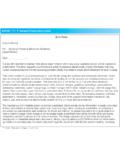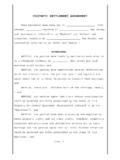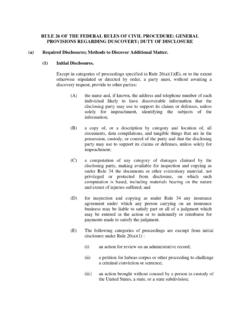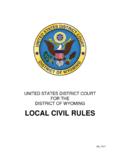Transcription of LOCAL RULES OF PRACTICE AND PROCEDURE OF …
1 LOCAL RULES OF PRACTICE AND PROCEDURE . OF THE. DOMESTIC RELATIONS DIVISION. OF THE MAHONING COUNTY COURT OF COMMON PLEAS. as Amended Effective February 1, 2012. General RULES Rule 1: Adoption, Scope and Construction of RULES Rule 2: Court Costs Rule 3: Filing and Removal of Papers from Custody of the Clerk Rule 4: Assignment of Domestic Relations Cases Rule 5: Powers of the Magistrates Rule 6: Ex-Parte Communications Rule 7: Out of State Counsel Pleadings, Motions and Orders Rule 8: General RULES of Pleading Rule 9: Service Rule 10: Temporary Orders by Affidavit or Oral Hearing Rule 11: Additional Ex-Parte Orders Rule 12: Contempt and Motions to Show Cause Rule 13: Objections to Decision/Motion to Set Aside Pre-Trial & Trial RULES Rule 14: Discovery Rule 15: Status Conferences Rule 16: Pre-Trial Conferences Rule 17: Trials Rule 18: Court Appointment of Valuation Experts Rule 19.
2 Medical Expense Schedule Rule 20: Qualified Medical Child Support Order (QMCSO). Rule 21: Dissolution of Marriage Hearings Rule 22: Divorce Hearings Rule 23: Judgment Entries, Decisions & Orders Rule 24: Division of Pension Orders Rule 25: Withdrawal or Substitution of Counsel Rule 26: Dismissal of Cases Rule 27: Motion for Relief From Judgment 1. Parenting Time and Visitation Rule 28: Parenting Time and Visitation Rule 29: Workshop for Parents & Children Rule 30: Guardian ad Litem Rule 31: Parenting Investigation Rule 32: Psychological Evaluations Rule 33: Interviews with Children Rule 34: Parenting Coordinator Rule 35: Consent Entries Dispute Resolution Rule 36: Family Services, Conciliation & Counseling Rule 37: Mediation Special Proceedings Rule 38: Domestic Violence Rule 39: Registration of a Foreign Decree Rule 40: Action on a Foreign Decree Rule 41: Concurrent Jurisdiction Rule 42: Certification to Juvenile Court Court Administration Rule 43: Conflicts of Interest Rule 44: Court Reporters Rule 45: Court Security Rule 46.
3 Photographing, Recording and Broadcasting of Court Proceedings Rule 47: Case Management Plan 2. RULES OF THE COURT OF COMMON PLEAS. DOMESTIC RELATIONS DIVISION. MAHONING COUNTY, OHIO. GENERAL RULES . RULE 1. ADOPTION, SCOPE AND CONSTRUCTION OF RULES . Adoption, Scope and Construction of RULES (A) Adoption: The Domestic Relations Court of Mahoning County, Ohio hereby adopts the following RULES for the Court's management of proceedings pursuant to Article IV, Section 5(B) of the Ohio Constitution and Rule 9 of the Ohio Supreme Court RULES of Superintendence for Courts of Common Pleas. (B) Scope: These RULES are intended to supplement and complement the Ohio RULES of Civil PROCEDURE and the RULES of Superintendence of the Supreme Court of Ohio. (C) Construction: These RULES shall be applied, construed and enforced so as to avoid inconsistency with other RULES of court and statutes governing proceedings of this Court.
4 In their application, they shall be construed so as to provide fairness and to secure just, expeditious and inexpensive determination of all proceedings. They shall apply to proceedings pending at the time they take effect. (D) Citation: As used in these RULES , "Civ. R." is a reference to the Ohio RULES of Civil PROCEDURE and "Sup. R. ___." is a reference to the RULES of Superintendence for the Supreme Court of Ohio. These RULES shall be cited as " LOCAL RULES " or " ___". (E) Court Forms and Website: The Court shall from time to time develop court forms for the efficient and equitable application of changes in Ohio law and these LOCAL RULES . The Court may also adopt Uniform Forms developed by the Ohio Supreme Court. All such forms as well as these LOCAL RULES shall be posted on the Court's Website which may be found at It shall be the duty of parties and counsel to regularly monitor the website for changes.
5 (F) Effective: These RULES as originally adopted on March 1, 1998 shall be effective February 1, 2012 and supersede all previous RULES promulgated by this Court. 3. RULE 2. COURT COSTS. Costs/Deposits: The Clerk of Court shall not accept any action or proceeding for filing without a deposit as security for costs in the amount set forth in the Schedule of Filing Fees/Deposits as set forth on the Court's Website. The Domestic Violence filings and Mahoning County Child Support Enforcement Agency filings are exempted from this requirement. Indigence: In the case of indigence, the court cost requirement is met by filing a poverty affidavit, as set forth on the Court's Website, stating that the party is without funds or assets to pay the deposit and a certification by the attorney, if any, that no or nominal attorney fees have been paid.
6 The party must also submit the Affidavit of Income and Expenses found on the Court Forms Section on the Court's Website. The filing of a poverty affidavit does not relieve a party from liability for court costs. If during the course of a proceeding, the Court learns that either party, is, or has become, able to pay the applicable costs, the Court may order either party to pay the deposit within a reasonable time. Responsibility for Costs: All judgment entries shall contain a provision for payment of costs as ordered by the Court. In the absence of court order, after application of all deposits, the balance of costs shall be divided equally between the parties. Special Assessments: Pursuant to , the Court has determined that additional funds are necessary to acquire and pay for special projects of the Court, including, but not limited to, the acquisition of additional facilities or the rehabilitation of existing facilities, the acquisition of equipment, the hiring and training of staff, community service programs, mediation or dispute resolution services, the employment of Magistrates, the training and education of Judges, and Magistrates, and other related services.
7 Accordingly, the Court will from time to time, authorize and direct the Clerk of Court to charge additional fees on the filing of each Complaint for Divorce, Legal Separation, Counterclaim, Petition for Dissolution of Marriage and other post decree/divorce Motions. RULE 3. FILING AND REMOVAL OF PAPERS FROM CUSTODY. OF THE CLERK. Filing of Papers: The Clerk of Court shall file and preserve all papers delivered to the Clerk for that purpose. The Clerk shall not accept or journalize on its docket any Entry, Decision or Order until it is signed by the Judge or Magistrate. 4. Removal: No person, except a Judge, Magistrate, Court Clerk, or their employees, shall remove any documents or case files from the Clerk of Court. Upon request, the Clerk shall allow any person to examine, but not remove, any original document or case file that is maintained by its office.
8 Examination shall be allowed during the regular business hours of the Clerk of Court. RULE 4. ASSIGNMENT OF DOMESTIC RELATIONS CASES. Assignment Commissioner(s): The Court shall designate Assignment Commissioner(s). for divorce, legal separation, annulment, dissolution of marriage and all other cases filed in this Court. Prior to filing a Petition for Dissolution of Marriage, the parties or attorney shall secure a hearing date from the Assignment Commissioner. The Assignment Commissioner shall assign for final hearing, all uncontested and contested divorces, legal separations, annulments, all other cases filed, and all other pre- and post-divorce motions. Uncontested Status: A divorce or legal separation case shall be deemed uncontested unless an Answer is filed within twenty-eight (28) days after service of the Summons and Complaint upon Defendant.
9 If the service of notice has been made by publication, Defendant shall file an Answer within twenty-eight (28) days after the completion of service of publication. Divorce Hearing Date: Pursuant to Civ. R. 75(K), no action for divorce, legal separation, or annulment may be heard and decided until the expiration of forty-two (42) days after the service of process or twenty-eight (28) days after the service of a counterclaim, which under this rule may be designated a cross-complaint, unless the Plaintiff files a written waiver of the twenty-eight (28) day period. Continuances of Final Hearing: Once a case is assigned for final hearing or trial, it may be continued only by leave of Court for good cause shown. RULE 5. POWERS OF THE MAGISTRATES. Authority: All Magistrates shall be awarded all of the powers set forth in Civ.
10 R. 53. The Magistrates are further awarded all other powers as set forth in the Journal Entries of this Court and the statutes of this state. 5. RULE 6. EX-PARTE COMMUNICATIONS. Ex-Parte Communications: No attorney or party shall discuss the merits, either orally or in writing, of any litigation with the Judge or Magistrate presiding over the matter without the presence of opposing counsel or the party, if not represented by counsel. RULE 7. OUT OF STATE COUNSEL. Out of State Counsel: Attorneys admitted to PRACTICE law in other states, but not in Ohio, may request permission from the Court to appear Pro Hac Vice (PHV). The decision of whether to permit representation by out-of-state counsel is a matter within the discretion of the Court. In order to be admitted pro hac vice, said attorney must comply with all of the requirements of Rule XII of the Ohio Supreme Court RULES for the Government of the Bar which include the following: A.




![[caption] RESPONSE TO REQUEST FOR …](/cache/preview/1/1/8/a/d/5/8/0/thumb-118ad58099489f856901e1c0e2921fe8.jpg)


